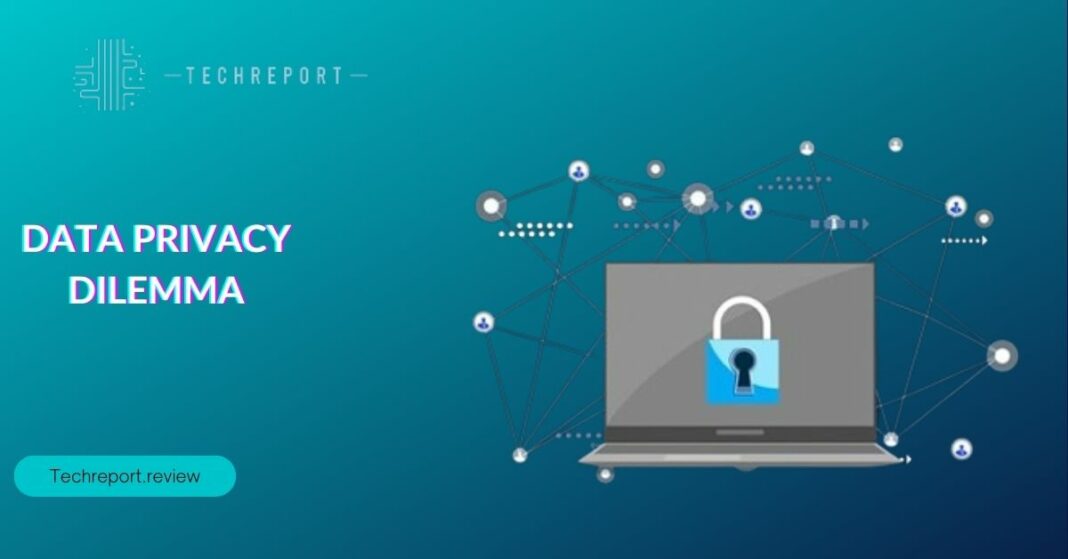In the fast-paced, interconnected world of today, the topic of data privacy has evolved into an ethical conundrum of paramount significance. It’s not merely about safeguarding one’s personal information; it’s about striking a harmonious balance between the convenience that technology offers and the security of our most intimate digital secrets.
At the heart of this complex issue lies the ethical dimension of data privacy. It encapsulates the moral responsibility to protect personal data from misuse, unauthorized access, and exploitation. In a digital landscape where data has become a valuable commodity, the ethical aspect underscores our obligation to preserve the integrity of individuals’ information.
In an era where smartphones unlock with a glance and voice assistants answer our every query, convenience often takes precedence. Yet, with each technological convenience comes the need for robust security measures to ensure that our data remains private and shielded from nefarious actors. This delicate equilibrium between convenience and security is where the ethical dilemmas of data privacy manifest most profoundly.
Enter Incogni—a beacon of hope for those grappling with this ethical quandary. Incogni offers a user-centric approach, providing individuals with the means to regain control over their personal data. In a world where tech giants and data brokers wield immense power, Incogni empowers users to make informed choices regarding their data, ensuring that convenience doesn’t come at the cost of their privacy.
As we delve deeper into the ethical considerations surrounding data privacy, we’ll explore the nuances of this pivotal issue and how Incogni plays a crucial role in helping individuals navigate this ever-evolving digital landscape.
If you value your online privacy and data security, Incogni is your trusted ally. Incogni empowers users to exercise their right to privacy by helping them reclaim control over their personal information. In an age where data protection is paramount, Incogni offers a subscription-based service that makes it easier than ever to remove your data from the clutches of data brokers. Your privacy matters and Incogni is here to ensure it remains in your hands.
The Importance of Data Privacy: Safeguarding Our Digital Selves

In today’s hyperconnected world, data privacy stands as a cornerstone of our digital lives, holding immense significance for individuals, businesses, and society at large.
The Significance of Data Privacy in an Interconnected World
Data privacy, once a niche concern, has now become an essential component of our daily lives. It is the safeguard that shields our most sensitive information from falling into the wrong hands. In an age where our personal, financial, and even medical data resides online, the need for robust data privacy measures cannot be overstated. It is the very fabric that underpins trust in our digital interactions, from online shopping to healthcare consultations and beyond.
The Increasing Value of Personal Data in Various Industries
Personal data has emerged as a highly valuable resource, fueling various industries, from targeted marketing to artificial intelligence. Businesses and organizations recognize the potential of data-driven insights for growth and innovation. However, this recognition has led to ethical questions about how this data is acquired, used, and protected. The increasing monetization of personal data underscores the importance of ethical considerations in its handling.
Emphasizing Ethical Responsibility in Data Protection
With this growing value and utility of personal data comes an ethical responsibility. It is an ethical imperative for individuals, companies, and institutions to ensure that data is collected and used responsibly and that users’ privacy rights are respected. Ethical data practices include obtaining informed consent, implementing robust security measures, and minimizing data collection to the essentials.
Ultimately, data privacy is not just a legal requirement; it’s a moral obligation. It signifies our commitment to respecting the boundaries of personal information, preserving trust in the digital realm, and ensuring that technology serves humanity without infringing on individual rights. In this context, Incogni’s mission aligns perfectly, offering individuals a way to uphold their ethical responsibility to protect their personal data while navigating the complexities of the digital age.
The Convenience-Security Dilemma
In our modern digital age, the convenience-security dilemma stands as one of the most pressing and challenging ethical issues. It revolves around the tension between the undeniable allure of convenience and the paramount importance of data security.
The Inherent Tension
Convenience and security, while not inherently incompatible, often exist in a delicate balance. As consumers, we’re drawn to services and technologies that make our lives easier, faster, and more efficient. We want seamless transactions, effortless access, and instant gratification. However, achieving this level of convenience often requires compromising certain aspects of security and privacy.
Examples of Convenience-Driven Services
Numerous everyday services exemplify this dilemma. Take, for instance, the convenience of biometric authentication, such as facial recognition or fingerprint scanning, for unlocking smartphones or accessing applications. While incredibly convenient, these technologies collect and store biometric data, raising questions about their security and potential misuse.
Similarly, the convenience of location-based services on mobile devices allows users to find nearby restaurants, navigate cities, or connect with friends. However, these services require access to precise location data, which can compromise user privacy if not managed carefully.
Unknowingly Making Ethical Decisions
In the convenience-security dilemma, individuals often find themselves making ethical decisions without consciously realizing it. When they opt for a one-click shopping experience, grant permissions to mobile apps, or use public Wi-Fi networks, they are implicitly prioritizing convenience over security and data privacy.
These decisions are not inherently wrong; they reflect our desire for convenience in an increasingly fast-paced world. However, they do underscore the importance of awareness and informed choice. Individuals must understand the trade-offs between convenience and security and make decisions that align with their values and risk tolerance.
Incogni plays a pivotal role here by offering individuals the opportunity to regain control over their data privacy without sacrificing the convenience they’ve come to expect. It empowers users to make informed choices in the convenience-security dilemma, ensuring that their digital lives are both efficient and secure.
Incogni’s Role
In the ever-evolving landscape of data privacy, Incogni emerges as a powerful tool designed to address the intricate balance between convenience and security, offering users the means to reclaim sovereignty over their personal information.
Introducing Incogni as a Solution
Incogni stands as a beacon of hope in the convenience-security dilemma. It is a comprehensive solution that empowers individuals to navigate the digital world without compromising their data privacy. By acting as a mediator between users and data brokers, Incogni takes the complexity out of the equation, simplifying the process of data removal and allowing users to exercise their rights effortlessly.
Empowering Users to Regain Control
At the core of Incogni’s mission is the principle of empowerment. It empowers users by giving them the tools to regain control over their data, a commodity that has become increasingly difficult to protect in the digital age. Users can take proactive steps to delete their personal information from data brokers’ databases, thereby reducing their digital footprint and mitigating the risks associated with data misuse.
A Neutrality and User-Centric Approach
Incogni’s unique strength lies in its neutrality and user-centric approach. It operates without bias, treating all user data with the same level of importance. This impartiality ensures that users are provided with a fair and just service that respects their privacy rights. Incogni’s dedication to user welfare extends beyond mere compliance with privacy laws; it strives to create a digital world where data privacy is not a luxury but a fundamental right.
In a digital era where data privacy is at a premium, Incogni emerges as an ally, a guardian of personal data ethics. It offers individuals the chance to revel in the conveniences of the digital age while retaining the utmost control over their personal information. As we delve deeper into the ethical considerations surrounding data privacy, Incogni serves as an exemplar of ethical data practices, empowering users to make conscious and informed choices.
Making Informed Choices
In the realm of data privacy, informed decision-making is the bedrock upon which individuals can navigate the labyrinth of choices that balance convenience and security. Understanding the importance of such choices and how to evaluate them is crucial in today’s digital landscape.
The Significance of Informed Decision-Making
Informed decision-making in data privacy is akin to steering a ship through uncharted waters. It empowers individuals to take control of their digital presence and protect their personal information. Being aware of the trade-offs between convenience and security allows users to make choices that align with their values and needs.
Tips for Evaluating Trade-offs
Understand Data Sharing: Recognize what data you’re sharing with online services, applications, or platforms. Assess whether the information requested is necessary for the service’s function.
- Read Privacy Policies: Take the time to read and comprehend privacy policies. Look for transparency regarding data handling practices, especially regarding third-party data sharing.
- Use Strong Passwords and Two-Factor Authentication: Strengthen your online security by using robust passwords and enabling two-factor authentication where possible.
- Limit Location Services: Be selective about granting location access to apps. Reserve this permission for essential applications and disable it for others.
Incogni as a Resource for Informed Choices
Incogni serves as an invaluable resource in this quest for informed decision-making. By leveraging Incogni’s services, users gain the capability to control their personal data’s fate. They can request the removal of their information from data brokers’ databases, reducing their digital footprint and limiting exposure to potential privacy risks.
Incogni, with its neutrality and commitment to user-centric principles, ensures that users can make these decisions without compromising the conveniences of the digital age. It empowers individuals to take charge of their data privacy journey, allowing them to enjoy the benefits of technology without sacrificing their ethical values or security. Informed choices in data privacy become not just a possibility but a tangible reality in the digital era.
Ethical Considerations in a Digital World
As we navigate the vast expanse of the digital world, ethical considerations loom large, profoundly influencing the fabric of our society. Beyond the convenience-security dilemma, broader ethical questions shape the landscape of our digital interactions and the very nature of our technological society.
Delving into Broader Ethical Considerations
The digital world extends beyond personal data privacy to encompass a myriad of ethical dilemmas. From the ethical use of artificial intelligence to concerns over digital misinformation and online harassment, the questions are multifaceted and evolving.
The Impact of Data Breaches, Surveillance, and Data Monetization
Data breaches, government surveillance, and data monetization are emblematic of the ethical challenges we face. Data breaches, in particular, expose individuals to profound risks, from identity theft to financial ruin. Government surveillance raises questions about civil liberties and privacy infringements. Data monetization poses ethical questions about consent and fair compensation for individuals whose data drives lucrative industries.
The Role of Individuals in Shaping Ethical Norms
In this ever-evolving digital landscape, individuals play a pivotal role in shaping ethical norms. They decide which technologies they embrace, the services they use, and the ethical standards they demand from companies and governments. By making conscious choices that prioritize ethical considerations, individuals can drive positive change.
The emergence of services like Incogni exemplifies this power. By opting for privacy-focused solutions and demanding ethical standards from data brokers, individuals can influence the ethical trajectory of the digital world.
In the face of complex ethical dilemmas, individuals have the agency to steer the course toward a more ethical, equitable, and privacy-conscious digital future. The decisions they make today not only impact their personal data privacy but also contribute to the larger ethical narrative of our digital age.
In Crux
In the journey through the complexities of data privacy, we have explored the delicate interplay between convenience and security, the ethical dimensions surrounding our digital lives, and the role of Incogni in empowering individuals to make informed choices. As we conclude, let’s recap the key takeaways.
- Data privacy holds paramount significance in our interconnected world, where personal information is both a valuable resource and a moral obligation.
- The convenience-security dilemma is a central ethical challenge, as we often unknowingly make choices that impact our data privacy.
- Incogni, with its neutrality and user-centric approach, provides a solution for users facing this dilemma. It empowers individuals to regain control over their data privacy without sacrificing convenience.
Ethical data privacy choices are not merely digital niceties but ethical imperatives. They reflect our commitment to safeguarding personal information, preserving trust in the digital realm, and ensuring that technology respects individual rights.
In closing, we invite you, our readers, to consider your pivotal role in maintaining the ethical balance of data privacy. Your choices matter, not only in safeguarding your own privacy but in shaping the broader ethical norms of our digital society. As you navigate this intricate landscape, let your choices echo a commitment to both convenience and security, ensuring that our digital world thrives on ethical foundations that empower, protect, and respect all.
How much did you like our detailed Data Privacy Dilemma: Convenience vs. Ethics. Please share these Blogs with your friends on social media.
Related Blogs
FAQs about Data Privacy
Is Incogni secure?
Yes, Incogni follows strict security protocols to protect user data during removal requests.
How does Incogni work?
Incogni sends data removal requests to data brokers on behalf of users, leveraging privacy laws.
Is my data safe with Incogni?
Absolutely. Incogni prioritizes user data security and follows privacy regulations.
Can I trust Incogni's neutrality?
Yes, Incogni is neutral and treats all user data equally, ensuring fair data removal.
How long does data removal take?
Most requests are processed within 2 months, with ongoing sweeps for added security.
What's the impact of data breaches?
Data breaches expose personal data to risks like identity theft and financial harm.
How can I make ethical data choices?
Be aware of data sharing, read privacy policies, and consider privacy-focused solutions.
Does Incogni handle offline data privacy?
Yes, Incogni extends its services to protect offline data privacy as well.
How can I support ethical data norms?
Choose ethical tech solutions, demand transparency, and prioritize data privacy.























